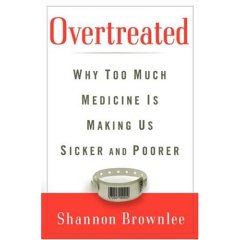The heart disease revenue pie is shrinking. So is the "serving size" being shared by competing hospitals.
In other words, as more hospitals open heart programs, there is more competition for the same heart patient. Throw into the mix the drop in "acute" presentations of disease, probably due to the now widespread prescribing of statin drugs. When I first started cardiology practice 15 years ago, for instance, days and nights spent taking care of heart attacks coming through the emergency room was a common event. It still happens, but far less frequently. (I don't mean to suggest that the actual prevalence of coronary heart disease has decreased, just the acute, catastrophic version of it.)
Throw into this mix the results of the COURAGE Trial that has put a damper on the value of stents and angioplasty vs. "optimal" medical therapy in people with stable anginal symptoms, since there was little advantage of procedures. Though it has not stopped the practice, it has reduced the enthusiasm for procedures. Though data are hard to come by, I've heard talk of 10% or greater drops in total procedural volume over the past year.
It's not uncommon for hospitals to have overbuilt heart facilities in anticipation of continued growth of this--until recently--growth industry called heart disease. However, factors are converging that may provide a new profit opportunity for hospitals.
One such opportunity is CT coronary angiography. The usual scenario: Man or woman without symptoms is persuaded somehow--an ad, primary care physician, next door neighbor with a scary event, Dr. Mehmet Oz gushing about this sexy new technology on yet another Oprah episode--to undergo a CT coronary angiogram. A "severe" blockage is found, despite the lack of symptoms, and voila! A stent patient or bypass patient is created out of nothing! Do this repeatedly and systematically, and a hospital can regain its former high-procedural volume glory.
Heart scans, though I believe deeply in them and they are the basis for the Track Your Plaque prevention and reversal program, can also be used and abused this way. Asymptomatic person has a score 150. Concerned, they go to their physician who orders a nuclear stress test. An "inferior perfusion defect" is seen, presumably representing poor flow through the right coronary artery (but often just means that the diaphragm overlaps the heart muscle and yields this apparition , a "false positive" or misleading result). "But--wink--we've got to find out if there's a severe blockage, don't we? You don't want to end up in an early grave!"
Thus, the battle for new patients with asymptomatic disease is getting underway in earnest. The scramble for cardiologists to learn how to use CT coronary angiograms is proceeding at breakneck speed, with new training courses being offered nationwide several times and places every month. CT coronary angiography is a useful test, but it is also subject to enormous abuse. It also provides the ticket for the unscrupulous physician and the revenue-hungry hospital eager to expand its patient volume.
Many people believe that this cannot happen commonly in 2007, given scrutiny of practices, litigiousness, and the expectation of a moral sense in medicine. However, I've witnessed such incidents several times this month alone. If you need graphic proof of just how far this can go before action is taken, read Coronary , Stephen Klaidman's chilling tale of a cardiologist and cardiothoracic surgeon in small-town northern California who built an enormous heart center based on fabricated heart disease diagnoses. You'll also find their story in Shannon Brownlee's recently released Overtreated: Why Too Much Medicine Is Making Us Sicker and Poorer .


Of course, the Track Your Plaque program is meant principally for people without symptoms, also. But we are advocating that asymptomatic disease is a reason for prevention , not procedures. There's a difference.
By the way, the two practitioners who engineered the escapade detailed in these books, cardiologist Chae Hyun Moon and cardiac surgeon Fidel Realyvasquez, walked away with a monetary fine and suspension of their California medical licenses. It is likely that many people died because of their abusive practices, but the state struggled to make a sufficiently persuasive case for reasons that I still don't understand.